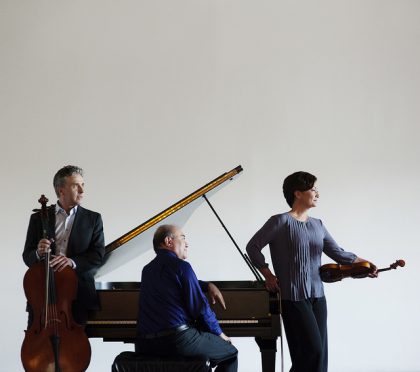Gryphon Trio provides shelter from the storm in Winter Chamber debut

The Gryphon Trio arrived at Northwestern’s Pick-Staiger Hall on Friday with the odds already stacked against them. Their concert coincided with a major snowstorm that had grounded their outbound flight, as pianist Jamie Parker noted, and produced a pitifully undersold hall.
The challenges were compounded by one of the group’s own making. Known for a varied playlist, the Canadian trio selected the most quintessentially canonical program imaginable for their Winter Chamber Music Festival appearance: an Austro-German marathon of Haydn, Beethoven, and Brahms. So the pressure was on to make these perennials — though not the composers’ biggest blockbusters — engrossing enough to justify a blustery trip.
However high the bar was raised, the Gryphons gleefully catapulted over it with effusive and well-buffed takes on old cornerstones by Haydn and Beethoven, and a sturdy if less inspired treatment of Brahms. This trio celebrated its 25th anniversary last year, a milestone audible in the group’s fine calibrated balance and cohesion — rubati ebbed and flowed with hardly a cue.
The concert began with an ending: Haydn’s last numbered piano trio, his No. 45 in E-flat Major. Inspired by Therese Bartolozzi, a gifted pianist Haydn met in London, the work bristles with virtuosic keyboard passages. Parker played these thoughtfully rather than flashily, a decision that extended to the entire interpretation.
Taking the trio a notch slower than most — then two notches in a pensive second-movement Allegretto — the Gryphons put forward an interpretation that treasured inner contrast and purity of tone above technical glitz. It was Haydn as one rarely hears it: By leaning into the work’s harmonic and formal lucidity, the Gryphons offered more to chew on than insouciant wit.
As the classical-period offerings continued, so did the captivating musicianship. Beethoven’s Trio in E-flat Major, Op. 70, No. 2 — the companion to his Ghost Trio — is replete with Haydnesque gestures and homages, like the expansive slow introduction to the first movement: Often played in a sweeping legato, the Gryphons played it in a shapely cantabile complete with breaths and lyrical phrasing.
The chronological arrangement of the program encouraged listeners to trace the development of the piano trio format, a trajectory which became especially pointed in the Beethoven. The second movement — a double variation which could easily sound repetitive or prim — has a symphonic expansiveness that was brought out nicely by the Gryphon Trio. Technical challenges seemed to mount by the movement, but finger-tangling passages in the piano and exposed double-stops in the strings ultimately posed no problem.
Violinist Annalee Patipatanakoon and cellist Roman Borys especially catalyzed the Haydn and Beethoven’s innate emotiveness: Interpretively unified, they steered the work forward employing creatively varied repetitions — a different dynamic here, a different bow stroke there — that never sounded hackneyed.
The survey inexorably led to Brahms’s Trio No. 2 in C Major, a work which takes the forms established by Haydn and Beethoven and runs with them. (As was convention in Romantic music, the dour third movement is a scherzo only in name.) The trio again flaunted their consummate chamber sensibilities, with seamless transitions and astute fluctuations in tempo.
Despite the program’s build-up, however, the Second Trio sounded the least inspired. The usual Brahmsian stumbling blocks weren’t to blame; as in the other works on the program, the Gryphons were remarkably well-balanced, even during dauntingly dense instrumental passages. But emerging from those murkily polyphonic passages into climaxes — most of all in the supercharged fourth movement — proved more troublesome for the musicians, who seemed to be either fatigued or over-correcting to the point of restraint. Nor was the Brahms afforded quite the same interpretive creativity as the Beethoven and Haydn, making the most harmonically complex piece on the program also the most staid.
That the Brahms fell just short of the high expectations the group sets for itself is ultimately a compliment. Let’s hope the Gryphon Trio’s festival debut will be followed up soon, and with a more adventurous program that better represents their far-flung repertoire.
The Winter Chamber Music Festival continues with the Catalyst Quartet 7:30 p.m. Sunday at Pick-Staiger Hall. music.northwestern.edu; 847-467-4000.
Posted in Uncategorized


